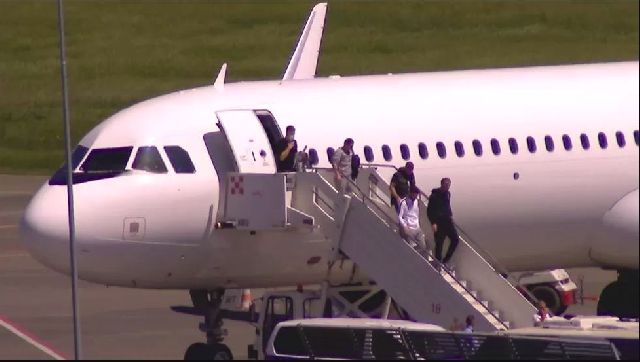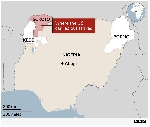Albanian prisoners paid by UK government to return home
 Deportation flights to Albania from the UK have increased following a joint co-operation agreement in December 2022
Deportation flights to Albania from the UK have increased following a joint co-operation agreement in December 2022
Albanian authorities have confirmed that most of its citizens forcibly sent back home from the UK this year were convicted of crimes there. The BBC has spoken to those men sent home, and learnt that some prisoners were offered £1,500 to leave - and some plan to come back.
Each week, a small crowd gathers at the razor-wire fence tucked around the back of Albania's Tirana airport.
The narrow runway beyond it, pinched between jagged black mountains and the high grey walls of the border police unit, is where UK deportation flights land - closely watched by the families waiting at the fence.
It takes hours for the deportees to appear, trickling slowly through the gate to be met with hugs, shy smiles and tears.
Deportation flights to Albania have increased since the country signed a joint co-operation agreement with the UK last December, to "deter and disrupt illegal migration".
The UK government's Home Office says more than 1,000 people have been returned since then: around half of them voluntary, the rest a combination of failed asylum seekers and foreign offenders.
The BBC spoke to dozens of people on several of these deportation flights last month, and found that most came from UK prisons.
Some had been offered money in return for agreeing to deportation, and were released from prison before serving their minimum sentence, under an existing scheme used for foreign offenders.
Albanian police confirmed that a majority of those forcibly returned this year were convicted of crimes in the UK.
One cheerful 30-year-old man said he had been serving a six-year sentence for drug offences, and was released for deportation after serving just two of them - a year before he would have been eligible for parole.
He asked us to hide his identity, so we're calling him Mark.
"The immigration officer came to see us," he said. "They ask if you want to go back [to Albania] or stay in UK. They explained that if you go back, they take one year off from your sentence."
Mark was also offered £1,500 in financial support to return home, under a separate programme called the Facilitated Return Scheme (FRS).
A UK government document clearly states that the scheme is "a financial incentive" offered to foreign prisoners "on the proviso that they co-operate with deportation and waive their right to appeal against it".
Other prisoners we spoke to on the deportation flights last month had been given the same amount.
Mark was deported under the UK's Early Release Scheme (ERS), used for foreign prisoners of all nationalities.
ERS does not require the consent of prisoners, but several Albanian deportees we spoke to, including Mark, said their deportation and sentence reduction were presented as voluntary.
"It was my choice to come back," Mark told me. "Nobody forced me. They offered it to me. They said, 'You decide if you want to go or want to stay'."
We asked the Home Office to confirm how many Albanians had been deported under the ERS since the start of last year, and how many had received financial incentives to co-operate, but it said it did not publish these statistics.
A spokesperson said in a statement: "The UK and Albanian governments work together to take every opportunity to intercept the work of people smugglers and speed up the removal of Albanians with no legal right to be in the UK."
Last year, the government's Nationality and Borders Act extended the early release period allowed under the ERS from nine months to a year. One of the aims of that change, according to a Home Office brief, was to increase the number of removals.
The same Act also abolished the expiry date for unserved sentences, meaning that prisoners who return to the UK illegally will have to serve the rest of their sentence, no matter how much time has passed - increasing the deterrent for people like Mark.
"I'm not going back there again," he said. "I'm not going to prison. Now I'm going to look for work, I'm going to be a good guy."
But several of those on the deportation flights last month said they were planning to return to the UK within weeks or even days, despite what many described as a new hard-line approach by police there.
"They're rounding up Albanians now," one man said. "It's very difficult for Albanians to stay in the UK because police stop you in the road. They don't want us now."
He said he had been sent back to Albania after police stopped the car he was in and found he was undocumented.
He is still planning to return.
Another man said he had already been back and forth to the UK three times. "It's not a problem for me," he said. "I'll go back whenever I want."
For many of those we spoke to, it was economic opportunities that drew them to the UK.
Not for Azem, though - a slight man in his late twenties, who seemed lost inside his clothes.
Azem - not his real name - told us his story on condition of anonymity. He also insisted we meet somewhere remote, where he wouldn't be overheard.
On a disused railway track over a pretty river sunk into the rolling landscape outside Tirana, Azem talked, his hands trembling.
He showed me documents detailing his removal from the UK, and the rejection of his asylum claim. He told immigration officials he had fled Albania after gang members put a gun to his head and threatened to kill him for his political activities.
He was returned back to Albania against his wishes last month.
"I'm afraid because the same situation can happen again," he said. "I've stayed quiet, I don't smile, I'm stressed and my body shakes all the time, I don't sleep much."
A UK psychologist's report, filed just before Azem's deportation, raised concerns that he may have experienced psychological torture in Albania.
A Home Office response said his experiences had already been considered in his asylum application, and that the decision was unchanged.
Azem told me he wouldn't hesitate to return to the UK illegally if he was threatened again, despite being blacklisted from entering the UK and EU countries. Albanians have free movement to countries like France and Belgium, which offer an easy springboard across the Channel.
Albanian police have recently stepped up checks at the country's border crossings, to catch blacklisted deportees trying to slip across.
The increased co-operation between the UK and Albania has coincided with a sharp drop in the number of Albanians arriving in small boats; just 29 were detected in the first few months of this year.
Much of that drop is likely to be seasonal and with the winter weather now easing, both governments are facing the first real test of their approach to tackling irregular migration.
I asked Albania's Interior Minister Bledar Çuçi what his country was doing to prevent the recent deportees simply returning to the UK.
"It's not possible to put a chip in everyone to follow where they go," he said. "If there are people with criminal records, especially in trafficking, then police will be on alert. But in general, the people who return are free citizens in Albania."
But alongside work on illegal migration, he said, the two governments needed to work on legal routes for Albanian citizens to reach the UK.
"I have suggested to my colleague, [UK Home Secretary] Suella Braverman, that we should also create the immediate legalisation of all Albanians who work in [the UK] at an honest job, and who have no criminal record," Mr Çuçi added.
Both Albania and British governments recognise the economic pull of the UK.
In the tiny northern-Albanian town of Krumë, 60% of the population has already gone. The first man I meet on the street there speaks English effortlessly, with a London accent.
Local politicians say more of the town's voters now live in east London than here at home.
Even those who remain here go to a café called "Britain" for their morning coffee; its entrance adorned with a full-sized London phone box.
The UK is putting more than £8m into training projects and businesses in Kukës - the region where Krumë lies - through an organisation that aims to change what it calls the "cultural norm" of illegal migration to the UK.
The Albanian government is also investing in infrastructure here, including a new airport. But locals have so far seen few tangible benefits.
We meet local mayoral candidate Miftar Dauti at a campaign rally for young people - his arrival greeted by an enthusiastic crowd of young supporters, and a deafening sound system playing a song called Democracy.
"What's the system where people don't dare to say what they think?" the lyrics scream. "Where journalists don't dare to say what's happening? Where the law only applies to you? Democracy, democracy, democracy!"
A strange choice for an election campaign, perhaps.
Mr Dauti is promising to stop the town's young people leaving for the UK. But even here amongst his own young supporters in the village hall, that promise is struggling to land.
"I want to be back in the UK," a lively, baby-faced supporter called Valda told me, as he watched the candidate leave. "This place isn't for me. I've been in the UK for two years and I want to be back there."
At a local park in Kukës town centre, grandparents watch young children play football beneath the snow-capped mountains, while single-sex groups of teenagers wander along the paths.
Locals say some children here say they want to be migrants when they leave school.
In one version of Albania's future, British tourists might flock here, transfixed by this region's stunning landscape.
But as so many young people here will tell you, futures don't happen Kukes. They happen in the UK.
Source: BBC
Trending World

Condom tax and cheaper childcare: China's plan to boost birth rates
19:05
Zelensky says peace deal is 90% ready in New Year address
18:59
Around 40 dead in Swiss ski resort bar fire
18:56
Bulgaria joins the euro after rocky path to new currency
00:16
Iran protesters try to break into government building as unrest continues
00:13
Mali and Burkina Faso impose travel ban on US citizens in tit-for-tat move
00:08
Bangladesh's first female prime minister Khaleda Zia dies aged 80
22:38
Thieves use drill to steal €30m in German bank heist
22:35
Guinea junta chief takes lead in controversial election as social media restricted
22:30
Living in fear of Lakurawa - the militant group Trump targeted in Nigeria strikes
19:31



